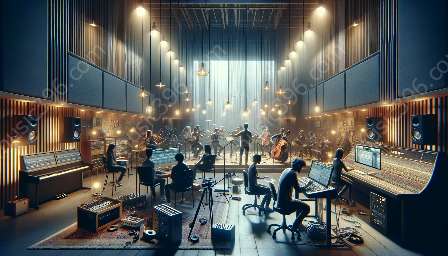Music composition software has revolutionized the creation, editing, and playback of musical pieces. As technology continues to advance, it is important to navigate the ethical considerations surrounding its use, particularly in relation to creativity, originality, and intellectual property. In this comprehensive topic cluster, we delve into the ethical implications of leveraging composition software and its compatibility with modern technology in the context of music composition.
Exploring Creativity and Originality
One of the ethical dilemmas inherent in using music composition software revolves around its potential impact on creativity and originality. While these tools undoubtedly enhance the efficiency and precision of music creation, there is a concern that they may inadvertently stifle the organic creative process. Musicians and composers may rely heavily on pre-programmed templates, loops, and auto-suggestions, potentially leading to a lack of originality and a homogenization of musical output.
Furthermore, the ease of editing and manipulation offered by composition software raises questions about the authenticity of a piece. Is it ethical to extensively modify a musical composition to the point where it becomes unrecognizable from its original form? These considerations prompt a critical reflection on the balance between technological convenience and artistic integrity.
Intellectual Property and Fair Use
The use of music composition software brings forth ethical challenges in the realm of intellectual property and fair use. With the ability to access a vast array of pre-existing samples, melodies, and sound libraries, composers must grapple with the ethical implications of utilizing copyrighted material within their own compositions. The line between inspiration and infringement can become blurred, leading to potential legal and moral repercussions.
Additionally, the issue of fair compensation and recognition arises when composers employ digital tools that facilitate the incorporation of existing musical motifs. Proper attribution and adherence to copyright laws are essential to uphold the ethical standards of the music composition process. Understanding the ethical frameworks of intellectual property in the digital age is crucial for maintaining the integrity of musical works.
Software Development and Consumer Advocacy
From a broader perspective, the ethical considerations extend to the developers and distributors of music composition software. It is essential for these entities to prioritize ethical practices in software development, ensuring that the tools provided empower creative expression while respecting the rights of artists and copyright holders.
Furthermore, consumer advocacy plays a significant role in shaping the ethical landscape of music composition software. Users should be informed about the ethical implications of the software they utilize, including its impact on originality, intellectual property, and the broader music industry. Transparency and ethical marketing by software developers can foster a culture of responsible and conscientious music composition practices.
Compatibility with Composition Software and Technology
The ethical considerations in using music composition software intersect with the ever-evolving landscape of composition technology. Compatibility with diverse software platforms, operating systems, and hardware introduces ethical responsibilities for developers to ensure inclusive access and equitable distribution of resources. Accessibility and inclusion are ethical imperatives that influence the design and deployment of music composition software.
Moreover, the ethical design and implementation of advanced features within composition software, such as artificial intelligence-based composition assistance, require meticulous consideration of their impact on the creative autonomy of musicians. Striking a balance between technological innovation and ethical usage is essential to preserve the integrity of the composition process.
Conclusion
In conclusion, the ethical considerations in using music composition software encompass a wide array of complex issues, ranging from the preservation of creativity and originality to the ethical utilization of technology in the music composition process. Navigating the intersection of composition software and technology with ethical integrity is crucial for fostering a sustainable and ethical ecosystem in the realm of music composition. By engaging in critical discourse and promoting ethical awareness, composers, software developers, and music industry stakeholders can collectively contribute to a conscientious and respectful approach to music creation in the digital age.




























